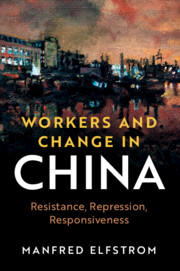Book contents
- Workers and Change in China
- Cambridge Studies in Contentious Politics
- Workers and Change in China
- Copyright page
- Dedication
- Contents
- Figures
- Maps
- Tables
- Acknowledgments
- 1 Introduction
- 2 Recipes for Resistance
- 3 Bureaucratic Incentives
- 4 Orthodox Control
- 5 Risk-Taking Control
- 6 Increased Repressive and Responsive Capacity
- 7 Bottom-Up versus Top-Down Change
- 8 Conclusion
- Appendices
- References
- Index
- Series page
4 - Orthodox Control
Published online by Cambridge University Press: 14 January 2021
- Workers and Change in China
- Cambridge Studies in Contentious Politics
- Workers and Change in China
- Copyright page
- Dedication
- Contents
- Figures
- Maps
- Tables
- Acknowledgments
- 1 Introduction
- 2 Recipes for Resistance
- 3 Bureaucratic Incentives
- 4 Orthodox Control
- 5 Risk-Taking Control
- 6 Increased Repressive and Responsive Capacity
- 7 Bottom-Up versus Top-Down Change
- 8 Conclusion
- Appendices
- References
- Index
- Series page
Summary
We were seated around a banquet table at a restaurant in the old part of Yangzhou, a canal city northeast of Nanjing, a couple of professors, a labor inspector, and myself. My interview notebook lay largely untouched, as the revolving tray at the center of the table spun around, delivering dishes. The talk focused on the hot topics of the moment – protests in Hong Kong, China’s economic slowdown, but not what I had come to discuss: the state’s supervision of labor relations, particularly in this region, Jiangsu’s portion of the Yangtze River Delta. Then, toward the end of the meal, the labor inspector suddenly launched into a passionate defense of the YRD’s approach to governing workplaces as compared to the region’s competitor further south, the Pearl River Delta. As he put it: “Thinking may be more open in the PRD by several years, may have felt more influence from the West, but there is better management in the YRD. In the north, politics tend to be more important … Things are more balanced” (Group Interview 54). When I asked the inspector about the Jiangsu government’s attitude toward labor civil society in particular, he continued, “In the YRD, the overall capacity to control is stronger than in the PRD – in terms of services provided, in terms of coordination, and in terms of containment” (Group Interview 54).
- Type
- Chapter
- Information
- Workers and Change in ChinaResistance, Repression, Responsiveness, pp. 70 - 86Publisher: Cambridge University PressPrint publication year: 2021

